Highfield & Brookham Schools - Hunter gatherer!
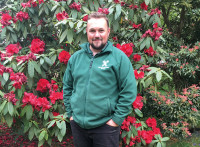
At the age of fifteen, Jason Hunter was already running his own landscaping business back in his native South Africa, whilst still at school. "I lived on a six acre property in Port Elizabeth," he begins, "and the work I did on the grounds saw me gain a runners-up spot in a national landscaping competition."
"I then moved on to landscaping commercial properties, whilst taking a Bachelor of Commerce correspondence degree at Oxford Brookes in Information Technology, which was paid for by the landscaping work."
Jason moved to the UK in 2005, working, for a short while, at the University of Surrey and for Glendales, before joining the grounds team at Charterhouse School in Godalming, Surrey, working under the experienced Dave Roberts, now Head Groundsman at Liverpool Football Club.
"It was whilst undertaking an FA Winter Sports Maintenance course at Southampton Football Club that I first met Dave, who was the tutor for the day."

After nine years at Charterhouse, and having attained the role of Head Groundsman, Jason felt that the time was right to move his career on and so applied, and secured, the Head Groundsman's role at Highfield and Brookham Schools, a position he has held for the past two years.
Highfield and Brookham is a short drive down the A3 (or the A286 if you take the pretty route) from Godalming, in the Hampshire town of Liphook, although the county borders with Surrey and West Sussex are but a stone's throw away. This area is very much rural southern England and, being in the 'commuter belt', the region is littered with well-to-do villages and small towns.
Over the years, I'd like to think that Jason and I have become good industry friends and it was whilst aiding (aka mocking) his application for British citizenship, something he attained in 2011, that he told me that he had traced his ancestry back to his ten-times Great Grandfather, John Senior from Yorkshire. "It still cost me £11k to gain my citizenship though," bemoans Jason.
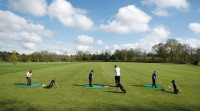
Highfield and Brookham share a 175 acre site which includes woodlands for biomass, sports pitches and a 9-hole golf field, but each occupies its own distinct areas. Brookham is a pre-prep and nursery school for 3-7 year olds that provides a 50m running track and pitches for football, hockey, rounders and cricket; the latter being the Kwik variety. Pupils also use areas of the more extensive Highfield sports grounds.
Highfield is a prep school for 8-13 year olds. Here, depending on the term, Jason and his team look after eight cricket squares - three built with loam for hard ball cricket and five cut out of the outfield for Kwik cricket - six hockey pitches, seven rugby pitches, nine rounders fields, six lacrosse pitches, nine football pitches and a 400m running track. All are natural grass. Additionally, there is a 9-hole, par 3 golf field alongside Brookham wood. "The greens are simply cut out of the field, so it would be stretching it to call it a course, but the pupils love it."

"Paul looks after the front of house and main school lawns; John looks after the golf field, and all marking out and sports pitch preparations, and Dan looks after the cricket squares and assists John on the golf field. Ashley looks after all the gardens."
"All staff are First Aid trained and Dan is trained in using a defibrillator."
"Additional help comes from Mark Atkins at Evolution Agronomics, Peter Marshall from Complete Weed Control/Japanese Knotweed Control and Lashley Landscapes, who are our groundworks contractors."
"We have a full staff training programme in place for the next two years. So far, we have completed Health and Safety at work, CosHh training, Working at Heights, Safeguarding Children, Fire Training, Telehandler and Mewp (Mobile Elevating Work Platform) training. Next year, we will undertake strimmer, tractor, ride-on and pedestrian mower training."
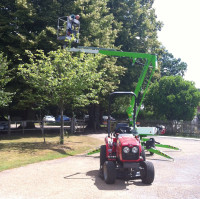
Asked to describe the soil profile, Jason confirms that it is primarily sandy loams across the site that have become destructured due to the low pH values. "We are correcting the soil profile to create better flocculation and environ for active rhizosphere microbiome, microbial functions and overall plant nutrient availability."
"Cultivation by aeration is a must to avoid saturated 'anaerobic conditions' and to support the microbial communities with a regular supply of their food stock (carbon, nitrogen, calcium, etc)."
"With help and advice from Mark Atkins, we have developed a programme to improve the pH. I take soil samples at least four times a year. It's imperative to know what is going on with your soil."
Jason says that the team strive for high presentation within the timescales allowed and within budget. To that end, in January each year, he prepares a month by month schedule of work for the year, detailing what task is to be undertaken and by whom.
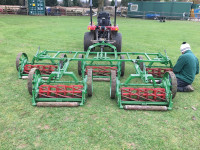
Jason explains that renovations are included in his budgets and the fruits of the investments over the past two years are starting to show. This includes full scarification, soil amendments and improvements and overseeding. "We don't generally have any outside pressures during our renovations. Good communication with the various stakeholders allows us to programme in our work."
Jason has instigated a number of projects since coming to the school. Amongst them has been the complete refurbishment of a set of Lloyds Leda gangmowers and a Stothert & Pitt cricket roller. Both now look absolutely pristine.

"We are also developing a new green waste processing area in the woodland, where we will be able to mulch, screen and store our compost, soils, and woodchip mulch."
And, as if that wasn't enough, respraying the tennis courts, removing diseased horse chestnuts, planting a new lime avenue, the replanting of the upper Brookham valley and the removal of banks and filling in of hollows are also on the list. "The latter are a nightmare to strim and a safety hazard," says Jason.
"Most of the work is completed in-house, but with occasional help from Andy at Lashley Landscapes, who undertakes small scale groundworks, i.e. paving, fencing and car park improvements."
Where the ecology and environment is concerned, Jason confirms that this is a high priority. "The local flora and fauna is very important.
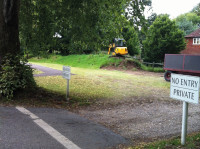
"For a number of years, the school estate (175 acres) has been following a Woodland Management Plan. We have commissioned a wider estate ecological survey and, once the survey is complete, we will be implementing a new Ecological Management Plan, hopefully by the end of this year. It is important to ensure that these two plans are integrated to ensure we achieve the objectives in terms of a sustainable woodland, habitat improvements and, as a consequence, more wildlife."
"We have close links with the South Downs National Park. We are working with them on our long term estate plan to make sure it integrates effectively with the park's objectives and policies."
"Additionally, we employ Ben Gardner from Ecology By Design as an environmental consultant"

"Before the new installation, the schools consumed an astounding 140,000 litres of oil a year. With the woodchip burner, we are making an instant saving on oil consumption, which can now be re-invested in other areas of the schools. In addition, we are also able to benefit from the Government's Renewable Heat Incentive (RHI) scheme which encourages the installation of renewable heat technology with financial incentives. Steve Marston from Marston Forestry wrote the woodland management plan, and he ensures we have a steady Supply of woodchip for the Biomass "
The schoolchildren are also benefitting. The woodchip burning process, along with other forms of sustainable energy, are being incorporated into the school curriculum. All pupils are able to visit the renewable energy installations, and Year 8 scholars are presently using their school iPads to find out about Biomass as part of a current project.
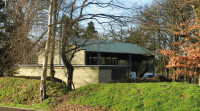
The school has now achieved Bronze, Silver and Green Flag Awards. As part of this, all the children have explored the whole concept of 'Reduce, Reuse, Recycle' and saving fuel and water. They have looked at environments that need our help and the affects of deforestation and global warming.
As for pests and diseases, Jason says that they have a small Japanese Knotweed problem; "which we are treating, and we try not to use pesticides wherever possible."

Jason has been steadily upgrading and improving the fleet of machinery as it had previously been "a bit basic." Everything is purchased outright and a machinery replacement schedule is in place. Preferred suppliers are Winchester Garden Machinery, Green Plant UK and Lloyds of Letchworth.
"We are not specifically loyal to one manufacturer; it depends on the operator's choice. For example, we were recently in the market for a new tractor and we arranged demonstrations for most of the tractors which we felt would suit our needs. In the end, we opted for a new John Deere 4066R, which we got from WGM."
"We've also added a Charterhouse Verti-Drain, a triple mower, an Amazone Profihopper and Gambetti sprayer to the fleet. In time, I'd also like to add a Graden Scarifier, Vredo Seeder, Blec Multivator and JCB 1 CXT mini digger with back hoe."
"We hire in a self-operated road sweeper three times a year for a good tidy up, plus a stump grinder as required."
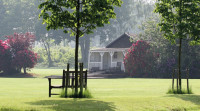
Asked about the state of our industry, Jason confesses that, as he has only worked in school environments where the work of the groundstaff has always been appreciated, he wonders if this is the case outside of the community.
"We need to raise our profile. Let's get on to the BBC. 'The Great British Groundsman' sounds like a good idea to me. After all, 'Bake Off' was a success, and then there was the 'Big Allotment Challenge'."
"I have a real concern with the lack of entrants into the industry. Over the past two years, we have found it difficult to recruit. We just don't get the applications coming in. Now, whether that's due to the demographic of our industry, searching for 'groundsman' jobs and not picking up 'grounds person' adverts, I have no idea!"
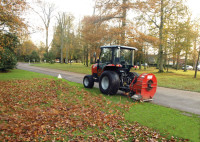
Monthly Schedule
January: Leaf clearing, snow clearing, salting, pruning and division, tree pruning and small tree felling, machinery maintenance, yard clearing and shed sort out, turning compost, aeration, over marking, cuttings, moss control, bulb planting, pest control (moles)
February: Rugby uninstall, lacrosse set-up, pre-season rolling, seed sowing, weed spraying, artificial wicket renovation, mulching, cross country set-up, fencing repairs, soil amendments and fertilisers, sweeping
March: Hockey uninstall, lacrosse uninstall, mark out, cricket set-up, cricket square preparation, mowing, hedge rejuvenation (box hedges)
April: Final leaf clearance, tennis set-up, mowing, weeding, cricket, over marking, weed spraying, fertilising, overseeding and pitch renovations
May: Cricket, bedding planting, mowing, strimming, edging, deadheading/pruning/trimming, school tidy-up
June: Cricket, mowing, strimming, weeding sports day set-up, hedgecutting, school tidy-up,
July: Tennis renovations, cricket renovations, cricket square shut down, weed spraying, strimming, summer projects, summer school
August: Initial marking, mowing, strimming, sports pitch preparation, weeding, winter bedding preparation, weed spraying, hedgecutting, school tidy-up
September: Mowing, strimming, hedgecutting, winter bedding planting
October: Weed spraying, weeding and pruning, mowing leaf clearing, overseeding, aeration, fertilising, worm control, bonfire, sports set-up
November: Fireworks, mowing, strimming, leaf clearing, frost, tree and shrub pruning
December: Snow clearing, leaf clearing, machinery servicing, pruning
